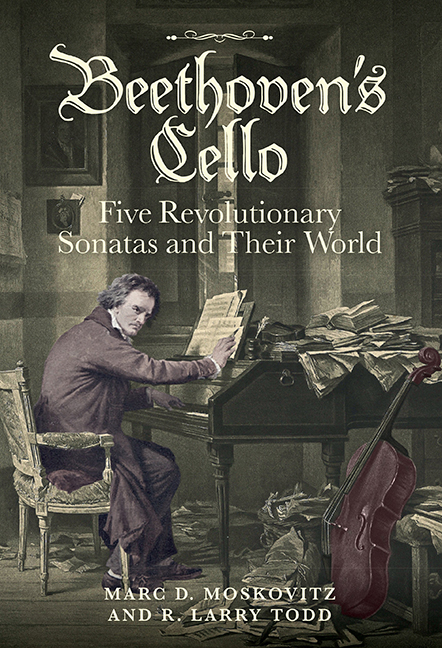Book contents
- Frontmatter
- Dedication
- Epigraph
- Contents
- Illustrations
- Foreword by Steven Isserlis
- Preface
- Personalia
- 1 From Bonn to Berlin
- 2 Music Fit for a King: The Sonata in F major Op. 5 No. 1 (1796)
- Interlude: Beethoven's Cellos
- 3 Tragic/Comic Masks: The Sonata in G minor Op. 5 No. 2 (1796)
- Interlude: Beethoven's Pianos
- 4 Themes and Variations
- Interlude: The Triple Concerto as Outlier
- 5 Friendship, War, Tears, and Grief: The Sonata in A major Op. 69 (1808)
- 6 Freedom and Control: The Sonata in C major Op. 102 No. 1 (1815)
- 7 ‘Most Remarkable and Strange’: The Sonata in D major Op. 102 No. 2 (1815)
- Interlude: Arranged Sonatas
- 8 Opus Posthumum
- Appendix 1 Primary Sources of Beethoven's Music for Cello and Piano
- Appendix 2 Reviews of Beethoven's Cello Music by His Contemporaries
- Notes
- Bibliography
- Index of Works by Beethoven
- General Index
1 - From Bonn to Berlin
Published online by Cambridge University Press: 18 April 2018
- Frontmatter
- Dedication
- Epigraph
- Contents
- Illustrations
- Foreword by Steven Isserlis
- Preface
- Personalia
- 1 From Bonn to Berlin
- 2 Music Fit for a King: The Sonata in F major Op. 5 No. 1 (1796)
- Interlude: Beethoven's Cellos
- 3 Tragic/Comic Masks: The Sonata in G minor Op. 5 No. 2 (1796)
- Interlude: Beethoven's Pianos
- 4 Themes and Variations
- Interlude: The Triple Concerto as Outlier
- 5 Friendship, War, Tears, and Grief: The Sonata in A major Op. 69 (1808)
- 6 Freedom and Control: The Sonata in C major Op. 102 No. 1 (1815)
- 7 ‘Most Remarkable and Strange’: The Sonata in D major Op. 102 No. 2 (1815)
- Interlude: Arranged Sonatas
- 8 Opus Posthumum
- Appendix 1 Primary Sources of Beethoven's Music for Cello and Piano
- Appendix 2 Reviews of Beethoven's Cello Music by His Contemporaries
- Notes
- Bibliography
- Index of Works by Beethoven
- General Index
Summary
IN 1789 TWO SEEMINGLY UNRELATED EVENTS occurred at the Prussian court of Frederick William II that would come to bear on Beethoven's earliest cello sonatas, works that profoundly altered how composers conceived of chamber music for this instrument. The first event was the arrival of the forty-year-old cellist Jean-Louis Duport, among the most celebrated musicians of his day and a favorite of the French nobility and public alike, who like so many others had fled Paris on the eve of the Revolution. The Frenchman headed northeast, to Berlin, where he took his place within a distinguished cello dynasty that served the monarch, himself an avid cellist. Here, in the royal service, Jean-Louis joined his brother, Jean- Pierre, who had instructed the young Frederick William while he was still a prince. And indeed, the year of Duport's arrival, Anton Kraft and his eleven-year-old son and protégé, Nicolaus, two cellists who later became intimates of Beethoven, made the pilgrimage in order to experience Prussian cello culture first-hand. Nicolaus would return to the Berlin court several years later, when he was taken under the wing of one or both of the Duports.
The second event involved another musician, Mozart, who during the spring of 1789 set out on the longest tour of his adult life. Leaving Vienna on 8 April, he traveled through Prague, Leipzig, and Dresden - where the composer met the Krafts and performed with the younger - before arriving in Berlin on 25 April. Though no cellist himself, Mozart was well aware of Frederick William's reputation as a musical aficionado and cellist; the composer hoped to ingratiate himself by bearing gifts that favored the king's preferred instrument. When Mozart arrived at court he was in financial straits and eagerly awaited a remunerative audience. A royal audience, however, was by no means guaranteed, even for a musician of Mozart's stature. And so, Mozart was first referred to Jean-Pierre Duport, cellist with the court orchestra and director of chamber music, and a man with whom Mozart evidently did not get on very well. Attempting to curry favor with the cellist, Mozart composed some ingratiating piano variations (K. 573) on a square-cut, harmonically unadventurous theme from the sixth of Duport's Sonates pour le Violoncelle Op. 4. Even so, it is not known whether Mozart's desired royal audience ever came to pass.
- Type
- Chapter
- Information
- Publisher: Boydell & BrewerPrint publication year: 2017



